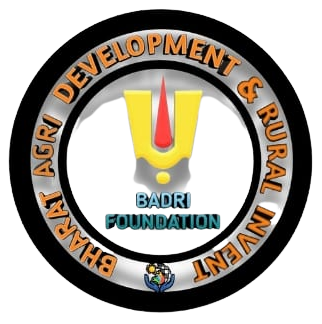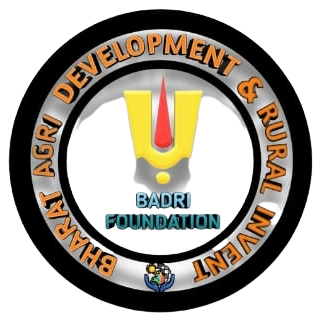Vision & Mission
Our Vision
To help build a future where people live in harmony with nature, where people have equal opportunities and shared responsibilities. A society where people have access to basic health and education, where people make optimal use of resources, and where the diversity of life thrives.
Our Mission
BADRI Foundation is a non-profit organization that works with communities to increase income, improve skills, care for the earth, and promote sustainable development. Our goal is to practice sustainable development and to help communities become self-sufficient. Bharat Agri Development & Rural Invent Foundation (BADRI Foundation) was established as a Social Enterprise registered under Section 8 of the companies act, 2013. Even though we had a humble start and limited resources we are moving forward placing our confidence firmly in the people.
One of our goals is to help deprived children realize their full potential through education. Through E-Gurukul centers, we aim to make them ready for their future life.
We shall work to bring social change and Inclusion by ensuring the participation of underprivileged individuals, groups, and communities in developmental activities.


The Core Issue: Migration
At BADRI Foundation, we opted for Uttrakhand to achieve our primary objective (rapid migration in rural areas) although this is a typical story of every rural part of India, here in Uttrakhand this problem has taken a more formidable form, due to the lack of healthcare and education facilities, and fewer employment opportunities the life of ordinary people has become inaccessible like a mountain. There is a saying in the mountain that "the water and youth of the mountain are not useful for the mountain" This proverb proves to be completely true here because migration has become such a serious problem here, which is becoming difficult to control day by day.
A study reveals that in three districts – Pauri, Tehri, and Almora, more than 10% of the population has migrated to other places after 2011. Similarly, more than 10% of villages of the same districts have seen an exodus. This study further shows that migration is mainly internal – from the mountainous districts to urban centers, within the districts, or within the state. About 734 villages are depopulated, and in 367 villages, the population has decreased by more than 50%. Unemployment is the major problem in rural areas as more than 50% of out-migration occurred for reasons of employment.
Apart from this, most of the economic opportunities are to be found concentrated in plain areas of the State, leading to huge income inequalities across the hill and plain districts of the State. Per capita income (measured in terms of per capita net District Domestic Product) in Pauri, Bageshwar, Champawat, Tehri Garhwal, and Almora districts is almost half of that in Dehradun and Haridwar. Due to this lopsided development, the pace of out-migration from the hill districts of the state could not be slowed down after the state's formation. Historically, these districts had well-developed social indicators in comparison to many other districts of the State, but due to continuous migration, not only social indicators but even cultural and social heritage of this land called ‘ Dev Bhoomi’ is being affected adversely.

Central and state governments are continuously working in this area to change the scenario but in spite of several efforts made by the governments these areas have not seen very significant development, and the disparities are increasing day by day. We don't intend to imply that governments are doing nothing to eradicate the problems but believe that due to demographic challenges of hilly regions it becomes difficult to even for the government to deal with regional problems efficiently.
Unemployment, education, and healthcare are the main issues due to which villagers continue to migrate. Migrating people know that there is observable better access to employment, health, and education in non-hilly regions.
To protect the rich social and cultural heritage of the state it is important to encourage people to reverse migration. At ‘BADRI Foundation’ it is our aim to support and facilitate better healthcare and educational facilities as well as to generate employment opportunities and develop a spirit of entrepreneurship in ‘Pahadi’ people with the help of our various awareness, training, and welfare programs.

Objectives
- To encourage penetration of healthcare services everywhere we work, and to promote health education.
- To advocate and support human rights, in particular children’s rights as well as the rights of the underprivileged.
- To encourage people to volunteer in social work.
- To impart quality education to the most disadvantaged, victimized, and marginalized children by using unique educational interventions, and to help build infrastructure such as classrooms, provide learning aids, promote socially meaningful curriculum development, and employment of child-centric joyful learning techniques.
- To address, whenever possible, other issues affecting human life such as environment, socio-economic aspects, and women’s issues.
Our Values

- Caring for the extent and quality of actual outcomes and not just hours or money spent. Reviewing the impact of work done periodically.
- To provide efficient stewardship of projects in order to get maximum output by utilizing the minimum amount of resources.
- We will encourage public review and participation. We will be flexible and responsive to changes in our social, economic, and technological environments.
- We are sensitive to the needs of all stakeholders in providing services. Cooperative relationships with organs of government, non-profits, and the business sector will be fostered. Employees shall be respected and will be provided with a conducive working environment.
- Our employees are our strength. Employees recognize that they are entrusted to provide public services and will conduct business in a responsive and professional manner that fosters public confidence.
- We rely on volunteers. the volunteer is an unpaid worker who participates in the spirit of pure volunteerism. Our volunteers’ lives are enriched by being of service to others.
- We do not discriminate on the basis of gender, race, color, religion, age, disability, gender orientation, lifestyle, etc.
- We support only secular community initiatives, projects or people. This means that we will not support initiatives or projects that are solely for the benefit of one religious community barring others. We will not support a particular political party or ideology either.
- We believe that only ethical pursuits last long. None of our projects should be dependent on personal benefits to project volunteers.
Our Belief
 It is our belief that people in rural areas are not able to have a sustainable livelihood due to a lack of education and awareness. To help improve the situation we aim to upskill them, promote a sense of entrepreneurship among them, and help them with the discovery of new avenues of self-employment.
It is our belief that people in rural areas are not able to have a sustainable livelihood due to a lack of education and awareness. To help improve the situation we aim to upskill them, promote a sense of entrepreneurship among them, and help them with the discovery of new avenues of self-employment.

Our Process
- Analysis of addressable issues and assessment of requirements
- Interaction with stakeholders
- Developing programs and strategies for development
- Empowering and developing local communities
- Conducting project works
- Routine and timely review of outcomes






 Copyright 2024 Badri Foundation, All Rights Reserved
Copyright 2024 Badri Foundation, All Rights Reserved